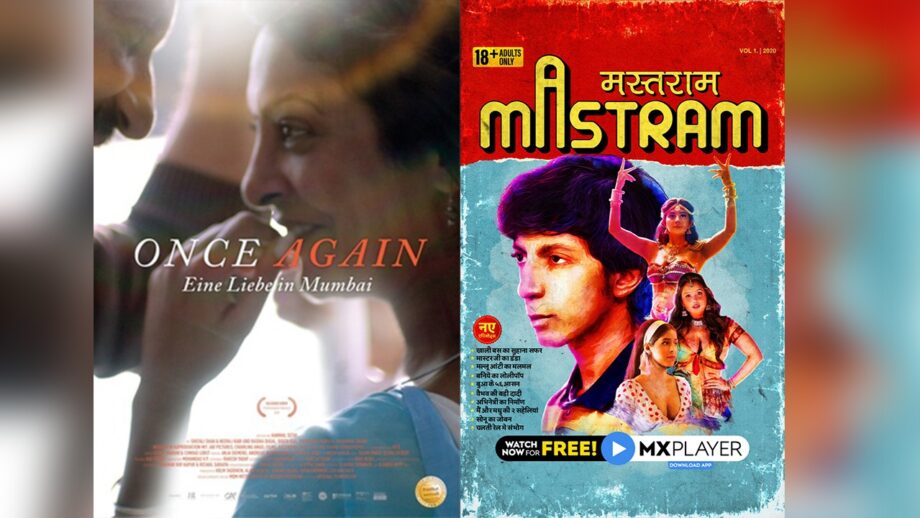Mastram(2014): Once upon a time, pornography was read in the loo, not seen on the internet. The imagination soared. Just think of how much money a man could make in the 1970 or 80s by penning po*n for a drooling generation.Unzip those inhibitions, will ya?If in Mastram, you expect a Boogie Nights kind of all-encompassing panoramic peek-a-boob…sorry boo, at the po*n industry, then you are in for an anti-climax. Mastram chronicling the life-story of a man, who would be kink, is a sad glum wistful look at the life of litterateur was persuaded to give po*n a chance, just to make ends meet.
Director Akhilesh Jaiswal lets the po*n writer Rajaram aka ‘Mastram’, played by Rahul Bagga, grow within a space where s*x is a synonym for survival. He must write dirty books to make a living. In Guru Dutt’s Pyasa, the poet Vijay faced the same dilemma. Write pulp, or perish, he was told. Vijay preferred to perish.Rajaram is a product of consumerist culture. With creditors knocking down his door, he chooses a life after debt.
For those expecting to see the rise and fall (and I don’t mean that in any other but the most physical sense) of a generation fed on porn, Mastram is not your cup of tea. It never goes into the author’s libidinous craft. It stays in his mind, probes and punctuates the protagonist’s perverse practice dispassionately.There is a pronounced absence of frenzied excitement in the narrative. If seen as a mating game, then, Mastram is a lazy evening of half-hearted copulation. We get to meet the man behind the orgasms. We feel the pain beneath the porn. Director Akhilesh Jaiswal tears at the layers of titillation and touches the pain and loneliness of an artiste compelled to sell s*x when all he wants is to write literary works.
Rahul Bagga plays ‘Mastram’ with an air of boyish curiosity and impassive mystery. We never know what he is thinking maybe because he isn’t thinking hard. Could this man be faking his enthusiasm for erotica? We never touch the man’s soul, but feel its presence in his life and specially in his bond with his wife, played with understated grace by Tara Alisha.Underscored by a sense of tragedy, Mastram brings a meditative melancholy to the po*n writer’s life.
Once Again(2018): What an undisguised blessing it is to see a film that pervades your senses with a sense of exhilaration and with the aromas of food and feelings that can only be experienced in Mumbai , the city that never sleeps even as the sleepless citizens seek some assurance that there is peace and harmony beyond the grind of the hubbub.
Two such restless souls are film-actor Amar Kumar (Neeraj Kabi) and single-mother and restaurateur Tara Shetty (Shefali Shah), both played by such magnificent actors that we can’t see the acting at all. They are lonely….oh gosh, yes, they are lonely as hell! It’s in their eyes. The longing, the need to find that comforting cuddle in the suffocating puddle of life.
Once Again is a pre-autumnal love story set in the heart of ‘heartless’ Mumbai where everyone is so busy living their lives, they forget their dreams. Tara cooks Amar’s meals .Eating her culinary creations are the highlight of his day. He savours the morsels like little portions of nectar dropped into his mouth from heaven.
The couple hardly gets the time to go past pleasantries to explore their growing relationship. He breaks protocol and arrives at her restaurant’s doorstep with handful of aromatic flowers, fleshly plucked it would seem, thought bought from a shop. The moment he sets his eyes on her Amar, without any trace of drama or flourish , comments on how beautiful Tara is.
The end-game where the director plays a they-are-together-they-are-not mind game, is not just a sighing compromise, it is also not clear whether the Tara-Amar relationship has a futureThere is no cascading violins. Only the distractingly reassuring noises of daily bustle captured with such a fine ear for the normal and the routine. A big shout out for the sound design and the cinematography which pulls no punches. The three heroes of the film Shefali Shah, Neeraj Kabi and Mumbai(in no particular order) are captured with a casual grace that leaves no space for adornments and brush-ups.
As Amar and Tara’s relationship finds breathing space in the suffocating environment of the humdrum, the romance reminded me ….no, not of Ritesh Batra’s wee overrated The Lunchbox (just because she cooks, he eats and they don’t meet for a while???!!!) but Guru Dutt’s Kagaz Ke Phool. I almost expected the couple to be caught in the glare of arclight to the aching sound of Waqt ne kiya kya haseen sitam.
Alas, there are other haseen sitam (beautiful offences) that await this film. In the second movement the narrative simply falls apart under the weight of conventions….the ones that are imposed on the widowed mother’s growing affection for the film star , and then those conventions that director Kanwal Sethi thrusts on the film: the disapproving son (played by the talented Priyanshu Painyuli who was so good in the titular role of Bhavesh Joshi), his impending wedding and the moral sanctions therein .
By the time Tara’s son’s mother-in-law sniggers,“So are we having two weddings in the family?” the cringe benefits are up for keeps.The end-game where the director plays a they-are-together-they-are-not mind game, is not just a sighing compromise, it is also not clear whether the Tara-Amar relationship has a future.This is a pity, really. Because Once Again raises a lot of hope in us. Its hopeful restrained and mature attitude towards mid-life romance , bolstered by solid central performances gives us a reason to believe Indian cinema is going past puberty.Just then, the film faces a mid-life crisis of its own.


